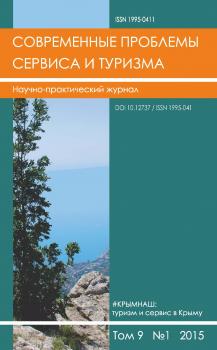Moscow, Russian Federation
from 01.01.2017 to 04.02.2017
Moskva, Moscow, Russian Federation
The article is focused on the ecotourism from the point of view of the ecological paradigm, the ecological imperative and the concept of natureuse. Based on the methodology of comparative analysis, the research experience in the field of ecotourism in foreign scientific practice is considered. It is noted that one of the fundamental problems of ecotourism is ambiguity and breadth of its interpretations and definitions. The authors consider controversial questions about the destructive function inherent in ecotourism, and outline the problem of its mythologization, the “crisis of legitimacy”, and the formation of the phenomenon of “eco-colonialism”. The article raises a problematic question about the discussion of the concept of ecotourism as kind of tourism, and substantiates the expediency of its positioning as an organizational form of the tourism industry. Within the framework of the discussion on components and the classification of ecotourism, the authors present their classification of ecotourism types depending on the motivation factors and quantity of tourists. On this basis, the authors distinguish three form-clusters of ecotourism, including 16 of its types. The problem of integration of ecotourism scientific schools of different countries is considered. The article considers the cases of the world experience of ecotourism and Russian practices of organization of this form of activity. The authors describe the principles for elaborating the ecological tourism marketing strategy of the Volga region. This region has huge potential for ecotourism development in the country, and its rich positive experience in this field can be taken as a basis for developing this kind of tourism activity in other regions of the country. The authors make conclusion about the necessity and urgency of a radical review of composition scheme and conceptual understanding of the phenomenon of ecotourism, which should become a paradigm of the whole tourism sphere, the basis for its further growth and development both in Russia and in the world.
ecotourism, ecological paradigm in tourism, ecological imperative in tourism, eco-colonialism, forms and types of ecotourism, ecotourism classification, sustainable tourism, cases of ecotourism in Russia.
1. Björk, P. (2000). Ecotourism from a conceptual perspective, an extended definition of a unique tourism form. International Journal of Tourism Research, 2, 189-202.
2. Blamey, R. (1997). Ecotourism: the search for an operational definition. Journal of Sustainable Tourism, 5(2), 109-130. doi:https://doi.org/10.1080/09669589708667280.
3. Brockelman, W. A., & Dearden, P. (1990). The role of Nature trekking in conservation: A casestudy in Thailand. Environmental Conservation, 17(2), 141-148. doi:https://doi.org/10.1017/S037689290003191X.
4. Buckley, R. (1994). A framework for ecotourism. Annals of Tourism Research, 21(3), 661-665.
5. Cater, E. (1993). Ecotourism in the Third World: problems for sustainable tourism development. Tourism Management, 14(2), 85-90. doi:https://doi.org/10.1016/0261-5177(93)90040-R.
6. Cater, E. (2006). Ecotourism as a Western Construct. Journal of Ecotourism, 5(1-2), 23-39. doi:https://doi.org/10.1080/14724040608668445.
7. Ceballos-Lascurain, H. (1987). Estudio de Prefactibilidad Socioeconomica del Turismo Ecologico y Anteproyecto Arquitectonico y Urbanõstico de Centro de Turismo Ecologico de la Reserva de la Biostera Sian Ka’an, Quintana Roo. Mexico: Study made for SEDUE Mexico.
8. Donohoe, H. M. & Needham, R. D. (2006). Ecotourism: The Evolving Contemporary Definition. Journal of Ecotourism, 5(3), 192-210. doi:https://doi.org/10.2167/joe152.0.
9. Eagles, P. F. J. (2001). Nature-based tourism management. In: Contemporary Perspectives on Tourism. Department of Geography Publication Series. Waterloo, ON: Department of Geography, University of Waterloo, 181-232.
10. Edwards, S. N., McLaughlin, W. J. & Ham, S. H. (1998). Comparative Study of Ecotourism Policy in the Americas. Washington, DC: University of Idaho and the Organization of America States.
11. Fennell, D. A. (2001). A Content Analysis of Ecotourism Definitions. Current Issues in Tourism, 4(5), 403-421. doi:https://doi.org/10.1080/13683500108667896.
12. Fennell, D., & Ebert K. (2004). Tourism and the precautionary principle. Journal of Sustainable Tourism, 12(6), 461-479. doi:https://doi.org/10.1080/09669580408667249.
13. Hall, C. M. (1994). Ecotourism in Australia, New Zealand and the South Pacific: Appropriate tourism or a new form of ecological imperialism? In: Ecotourism: A Sustainable Option? London & Chichester: Royal Geographical Society and John Wiley, 137-157.
14. Hetzer, D. (1965). Environment, tourism, culture. UNNS, Reported Ecosphere, 1-3.
15. Higham, J. E. S. & Carr, A. (2003). Defining ecotourism in New Zealand: differentiating between the defining parameters within a national/regional context. Journal of Ecotourism, 2(1), 17-32.
16. Honey, M. (2008). Ecotourism and Sustainable Development: Who Owns Paradise? Washington, DC: Island Press.
17. Hvenegaard, G. (1994). Ecotourism: a status report and conceptual framework. The Journal of Tourism Studies, 5(2), 24-35.
18. Lawrence, T. B., Wickins, D. & Phillips, N. (1997). Managing legitimacy in ecotourism. Tourism Management, 18(5), 307-316. doi:https://doi.org/10.1016/S0261-5177(97)00020-4.
19. Lian, Y. L. (2005). A case study on the effects of tourism development on the Baima community - development of tourism in ecologically and culturally sensitive zones. Tourism Tribune, 20(3), 13-17. (in Chinese).
20. Lindberg, K., Enriquez, J., & Sproule, K. (1997). Ecotourism questioned: Case studies from Belize. Annals of Tourism Research, 23(3). 543-562. doi:https://doi.org/10.1016/0160-7383(95)00074-7.
21. Lindberg K., & Hawking, D. (1993). Ecotourism: A Guide for Planners and Managers. Vol. 1. The Ecotourism Society, North Bennington.
22. Lindberg, K., & McKercher, B. (1997). Ecotourism: A critical overview. Pacific Tourism Review, 1(1), 65-79.
23. Mowforth, M. & Munt, I. (2003). Tourism and Sustainability. London: Routledge.
24. Newsome, D., Moore, S. A. & Dowling, R. K. (2002) Natural Area Tourism: Ecology, Impacts and Man- agement. Clevedon: Channel View Publications.
25. Nievaart, S. (2006). Ecotourism is an oxymoron. Sustainable tourism as alternative? The case of Costa Rica. URL: https://ru.scribd.com/document/127723044/Ecotourism-is-an-Oxymoron (Accessed on October 25, 2017).
26. Ross, Sh., & Wall, G. (1999). Ecotourism: towards congruence between theory and practice. Tourism Management, 20(1), 123-132. doi:https://doi.org/10.1016/S0261-5177(98)00098-3.
27. Sahlins, M. D. (1965). Culture and environment: The study of cultural ecology. Washington: Voice of America.
28. Steward, J. (1955). Theory of culture change. Urbana: University of Illinois Press.
29. Tuohino, A., & Hynonen A. (2001). Ecotourism - imagery and reality. Reflections on concepts and practices in Finnish rural tourism. Nordia Geographical Publications, 30(4), 21-34.
30. Valentine, P. (1993). Ecotourism and nature conservation. A definition with some recent develop- ments in Micronesia. Tourism Management, 14(2), 107-115. doi:https://doi.org/10.1016/0261-5177(93)90043-K.
31. Vayda, A. P., & Rappaport, R. A. (1968). Ecology: cultural and non-cultural. Introduction to cultural anthropology, 488-499.
32. Wallace, G. N. & Pierce, S. M. (1996). An evaluation of ecotourism in Amazonas, Brazil. Annals of Tourism Research, 23(4), 843-873. doi:https://doi.org/10.1016/0160-7383(96)00009-6.
33. Weaver, D. B., & Lawton, L. J. (2007). Twenty years on: The state of contemporary ecotourism research. Tourism Management, 28(5), 1168-1179. doi:https://doi.org/10.1016/j.tourman.2007.03.004.
34. Weaver, D. B. (2005). Mass and Urban Ecotourism: New Manifestions of an Old Concept. Tourism Recreation Research, 30(1), 19-26. doi:https://doi.org/10.1080/02508281.2005.11081230.
35. Wells, M. & Brandon, K. (1992). People and Parks: Linking Protected Area Management with Local Communities. Washington, DC: World Bank, WWF and USAID.
36. Wight, P. A. (1993). Ecotourism: Ethics or Eco-sell? Journal of Travel Research, 31(3), 3-9. doi:https://doi.org/10.1177/004728759303100301.





